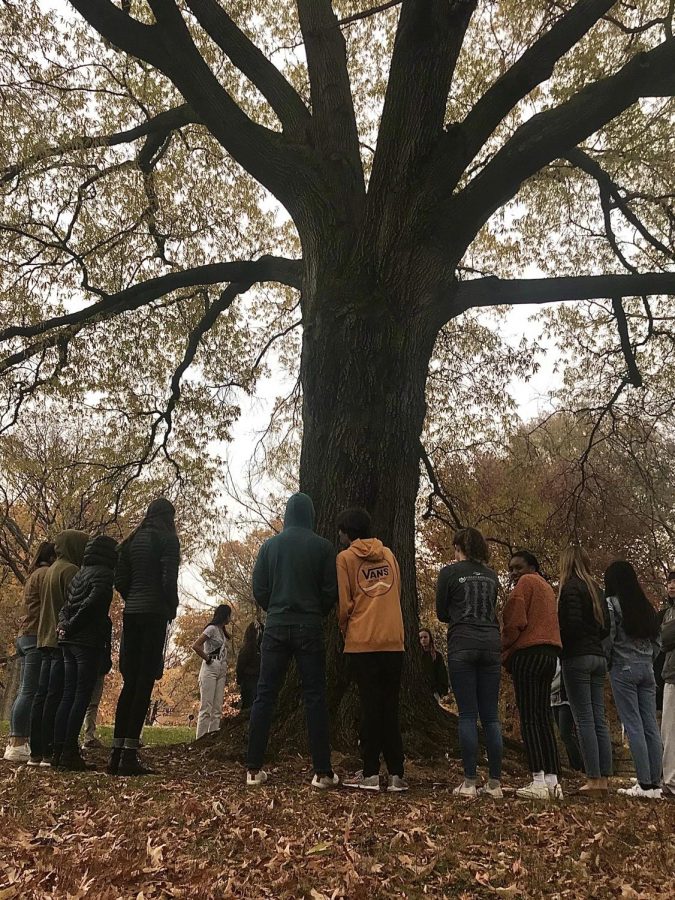Meditation as a philosophical lesson
How the IB Philosophy class uniquely incorporates meditation
To begin the meditation, students float face up in the surrounding water, held up in the arms of a classmate to release the strain of staying above water. With eyes closed, the goal is for students to meditate in the simulation of a womb. The International Baccalaureate (IB) Philosophy class meditates in the school’s pool once a year for ten minutes. Meditations are not standard class curriculum, but in this class, meditations are practiced regularly.
Mr. Robert Summers, the IB Philosophy and IB Social Anthropology teacher, has been teaching at the school for about 16 years. For all of his years of teaching, he has incorporated meditation into his philosophy class. With a goal of weekly meditations, Mr. Summers takes time to teach as well as destress students.
“Meditation is a medicine that you can see as a nourishing medicine with which to combat the condition of our lives, and highly stressful, high anxiety producing circumstances,” Mr. Summers said. “It is a tool that I use and try to impart to students, a tool with which to counter these pressures and the intense pressure we place on ourselves.”
Mr. Summers is backed up by several studies on the benefits of meditation. According to the “Harvard Gazette”, meditation is beneficial in improving emotional stability and responses to stress.
“It’s a great break from the typical classroom setting, and definitely relaxes and refocuses my mind,” senior Olivia Jazwick said. “It’s kinda the opposite of straining, it re-energizes my brain so I can go about the rest of my day feeling much more at peace and focused.”
In Mr. Summers’ class, however, these meditations provide more than just relaxation benefits. They also align with the intensive curriculum. Students are able to learn about Western and Eastern philosophy through Mr. Summers’ incorporation of the curriculum into these meditations. Reflection allows students to connect their experiences to important class topics.
“They are somewhat variants of certain cultural styles [including] Chinese Qigong meditation and simplified versions of Buddhist Zazen meditation,” Mr. Summers said. “It naturally followed that I could easily apply it to epistemology and rationalism because I use that as a foundation to study philosophy, the debate between rationalists and empiricists.”
Mr. Summers begins his class in September with an introduction to epistemology and rationalism. Epistemology, the theory of knowledge, and rationalism, a theory that ideas should be based on reason rather than senses or religion, are both important concepts in the world of philosophy. Both are philosophical approaches used to help interpret what is unknown, as philosophy is the study of reality, existence and knowledge. Chinese Qigong meditation is controlled breathing meditation used as a healing technique. In Buddhist Zazen meditation, one must focus on attention regulation to achieve a specific mental state.
Not only does philosophy revolve around the mind, similar to meditation, but a major concept in the class is empiricism, or sense perception.
“We use different meditation styles to experience the world around us through different perspectives, and to put ourselves in new, sometimes uncomfortable situations to open our minds,” senior Anthony Lawson said. “Sometimes [the meditations] have a very specific connection if we are discussing a topic that relates to a certain type of meditation, but there is always a larger connection.”
Unlike the usual guided, silent or music-filled meditations many people are used to, Mr. Summers provides more unusual meditations in his class. Included is a meditation where students dull their senses of hearing and sight with earplugs and blind folds. For 20 minutes, students sit at the playground next to Route 66 near the school, entertained by thoughts alone.
“Sensory deprivation meditation has made me feel like I have superpowers,” senior Angelo Lepore said. “If you journey far enough you get to this point where you feel like you’re traveling through the universe. You feel new things.”
The philosophy class provides students with a chance to question not only mind as a subject, but their own mind through meditation. Mr. Summers’ distinctive methods of meditation provide students with an uncommon educational opportunity.
“In philosophy it is generally agreed upon that we all have to understand ourselves before we understand the world around us,” Lawson said. “Meditation is an opportunity for us all to better understand our own minds and their abilities, which in turn prepares us to talk about both ourselves and the world around us.”










